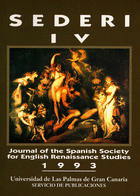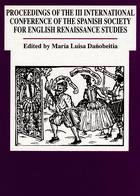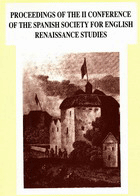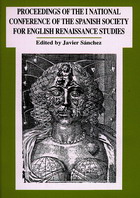
Sederi 4
Edited by Teresa Guerra Bosch
Sederi — Universidad de Las Palmas de Gran Canaria
1993
ISBN 84-88412-02-9
Contents

Sederi 4
Edited by Teresa Guerra Bosch
Sederi — Universidad de Las Palmas de Gran Canaria
1993
ISBN 84-88412-02-9
Contents

Sederi 3
Edited by María Luisa Dañobeitia
Sederi — Granada
1992
ISBN 84-7933-105-4
Contents

Sederi 2
Edited by S. G. Fernández-Corugedo
Sederi — Universidad de Oviedo
1992
ISBN 84-7468-512-5
Contents

Sederi 1
Edited by Javier Sánchez Escribano
Sederi — Universidad de Zaragoza
1990
ISBN 84-7733-218-5
Contents
CALL FOR PAPERS – SEDERI YEARBOOK SEDERI, the Yearbook of the Spanish and Portuguese Society for English Renaissance Studies, is an annual publication devoted to current criticism and scholarship on Early Modern English Studies. It is peer-reviewed by external readers, following a double-blind policy. It is published in paper and online, in open access. […]
Editorial Board
Francisco José Borge López (U. Oviedo)
Clara Calvo López (U. Murcia)
Berta Cano Echevarría (U. Valladolid)
Jorge Figueroa Dorrego (U. Vigo)
Keit Gregor (U. Murcia)
Mark Hutchings (U. Reading, UK)
Tamara Pérez Fernández (U. Valladolid)
Juan A. Prieto Pablos (U. Sevilla)
Ana Sáez-Hidalgo (U. Valladolid)
Scientific Committee
Maurizio Calbi (U. Salerno, Italy)
Rui Carvalho Homem (U. Porto, Portugal)
Pilar Cuder Domínguez (U. Murcia)
Michael Dobson (Shakespeare Institute, UK)
John Drakakis (U. Stirling, UK)
Teresa Fanego (U. Santiago de Compostela)
Manuel Gómez Lara (U. Sevilla)
Dolores González Álvarez (U. Vigo)
Santiago González Corugedo (U. Oviedo)
Derek Hughes (U. Aberdeen, UK)
Douglas Lanier (U. New Hampshire, USA)
Jesús López Peláez Casellas (U. Jaén)
Zenón Luis Martínez (U. Huelva)
Salomé Machado (U. Lisboa, Portugal)
Andrew Monnickendam (U. Aut. Barcelona)
Javier Pérez Guerra (U. Vigo)
Ángel-Luis Pujante (U. Murcia)
Tiffany Stern (U. Oxford, UK)
Keith Whitlock (Open U., UK)
Laura Wright (U. Cambridge, UK)